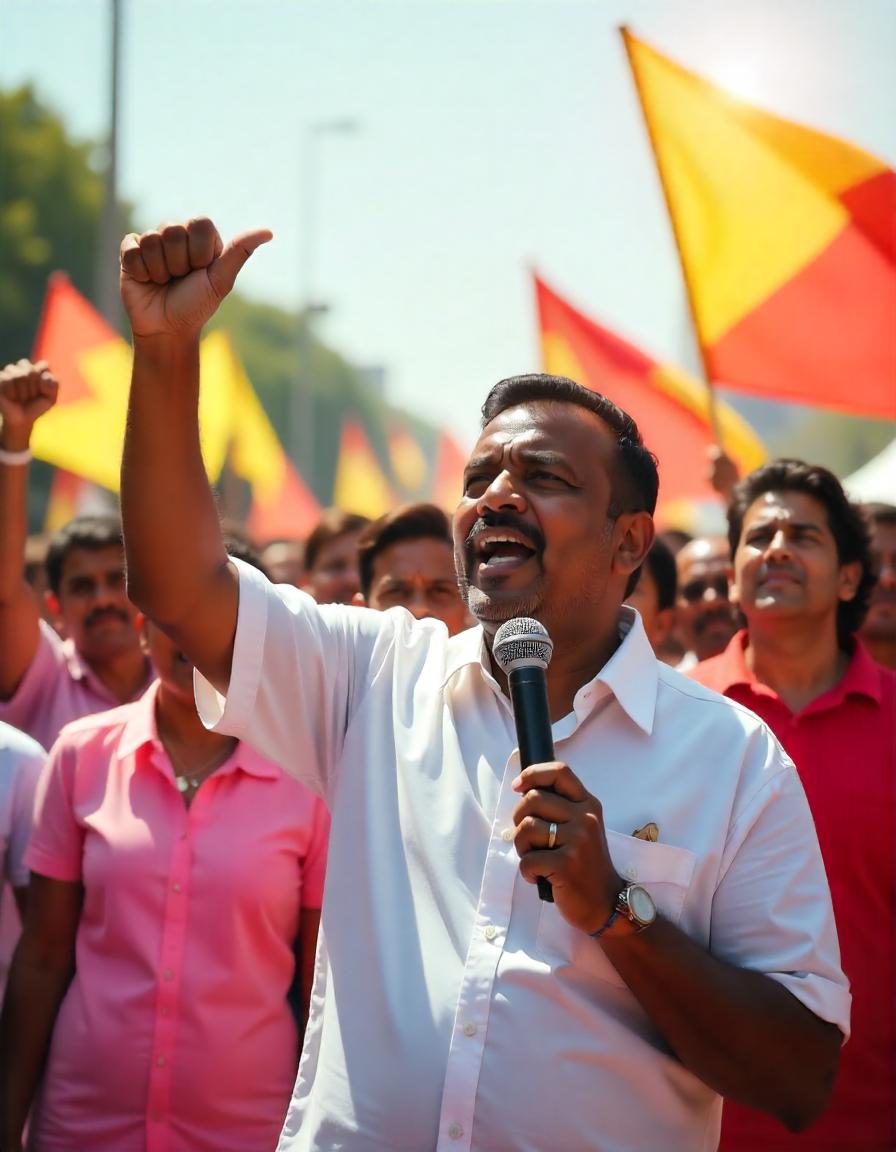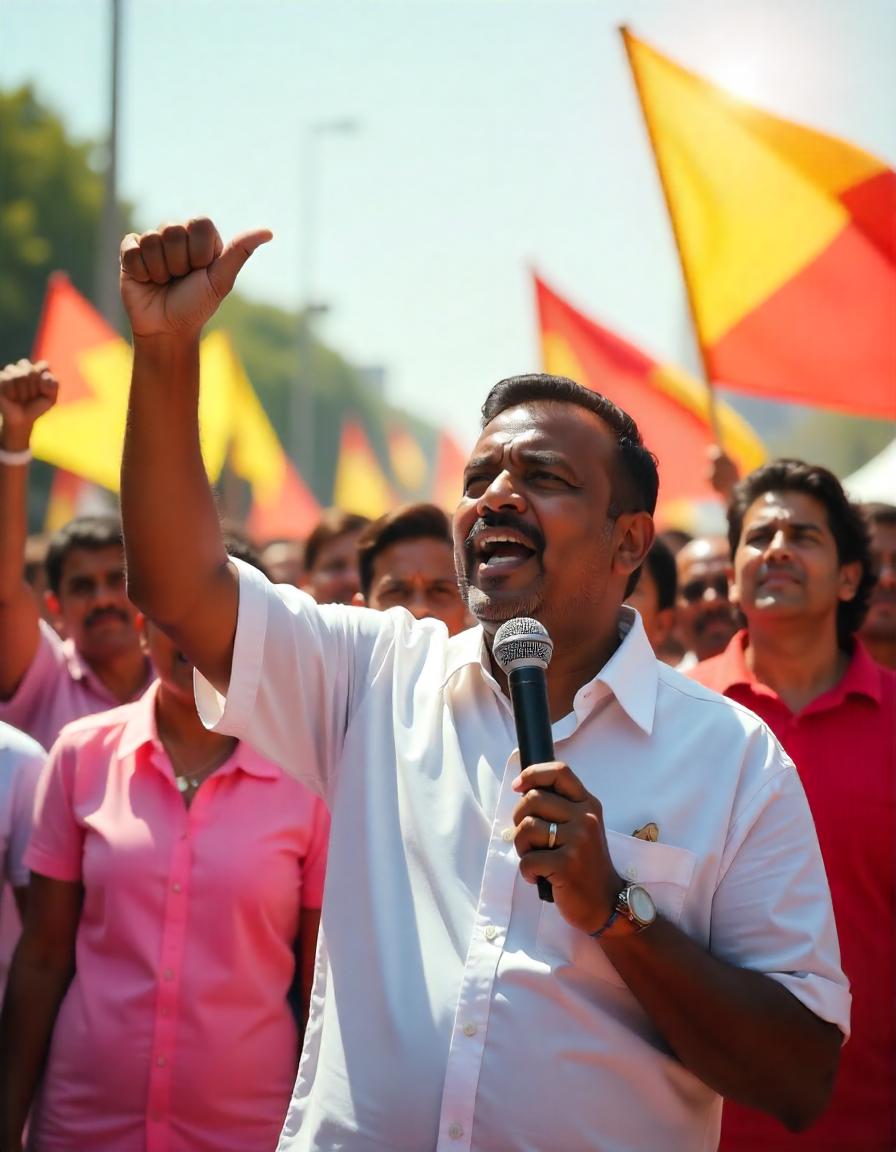Recently, the politics of Tamil Nadu has been turbulent owing to harsh criticism inflicted on the ruling Dravida Munnetra Kazhagam (DMK) party, more so by the leader of the TVK party, Vijay. There is, however, more to the context as the circumstances increased due to controversial comments made by the leader of the VCK, a partner party of DMK during the elections that spurred foul relations between all coalitions admiringly referring to it as ‘monarchy politics.’ This comment stirred quite a storm and threatened the fragile relationship between the DMK and their partners.
Vijay of TVK Critiques the Leadership of DMK.
Vijay who leads the Tamil Veda Kazhagam (TVK) has lambasted the policies and leadership of the DMK government. Though Vijay carries an insult sensitive persona, he has always been charged in taking the DMK to task on not observing its basic tenets of Dravidian ideology – which was basically centered on protecting the interests of the oppressed and the downtrodden. He argues that under the leadership of CM M.K. Stalin the DMK has been evolving towards a more absolutist style, suppressing their smaller partner’s needs whilst disregarding the real spirit of coalition politics.
As such, this critique by Vijay also highlights the growing concern of regional and minor parties who feel that their voices are drowned out within the current political setup.
As the lead party in the coalition, the DMK is said to have left the impression of being overbearing over its allies, pushing through its agenda at the expense of the smaller parties. Discontent among the grassroots supporters of TVK is increasing as they think that the recent strategies of the DMK especially in terms of economics and social welfare do not address or meet their aspiration and objectives.
However, the most substantial damage to the coalition took place after VCK leader Thol. Thirumavalavan made a somewhat reckless yet controversial declaration about what he alleges to be an ever-growing trend of “monarchy politics” in DMK. Thirumavalavan a prominent Dalit leader from Tamil Nadu raised concern over the dynastic tendencies of politics which seems revolving around the Stalin family. He also suggested that the internal democracy of the party is being eroded as it appears that very few people make all the decisions.
Thirumavalavan’s remarks were particularly interesting because VCK has been the important ally for at DMK at least in Dalit and backward class constituencies.
The claim levied by Thirumavalavan stating the leadership of the DMK as ‘monarchy politics’ essentially damaged trust with regards to the coalition because it outright defied the legitimacy of M K Stalin which was deemed necessary in the party after his father M Karunanidhi’s demise. His statements rapidly began to develop into the topic of interest in the media attracting the attention of the opposing parties who saw this as an opportunity to point out the disharmony existing among parties in the coalition that made the ruling government.
Political specialists have pointed out that the uncompromising censure by Thirumavalavan is indicative of an opinion that is widespread among the people – that the DMK, like many other regional parties, is increasingly becoming a political family rather than a political democracy. Political Consequences and For what the must live with Politically active So Consequently the political meaning of the comments made by de Thirumavalavan affected have spasmodic results A number of DMK followers in the party have registered their objection about the VCK leaders comments and some have even questioned the loyalty of the party to the letter of the alliance.
For the reason that DMK has been very democratic is also suspected, however has continued to maintain that it has been its leadership style by describing the nature of their government as democratic and by extolling the participatory nature of its governance. Referring to Pol Theo societhereforse develop contextures that V Thri First, Sas to Joseph deme Kombang S Becaysno either in Changchun over assertions that the DMK is or will become dynastically inclined in political issues. The damage though may have been done in fact.
Thirumavalavan’s question regarding the “monarchy politics” has brought out a crack within the alliance, and this may matter a great deal in the next months especially when the state is bracing itself for forthcoming elections. As one potential source of the VCK antagonism towards DMK , this comment by Thirumavalavan will anger many people, as he speaks for many Thirumavalavan, who form a substantial chunk of the Dalit constituency who have been Amil ID All India MDMK Programme and Publications the class that forms the majority in the politics today.
If DMK does not do something to resolve these problems?, Then troubles will come along spending, these will be crushing blows for DMK to maintain support from the Dalits in the upcoming elections. Consequences for the DMK’s Alliances and Prospects The VCK feels that the internal power struggles within DMK concerning leadership has not been settled and that they have been simmering for a long time. This is one such problem that has been hidden, very well in fact, by the DMK during its deals. Regardless,
the DMK has managed to keep their relationships with other parties intact, but this one may be difficult to resolve. The VCK and other minor allies expect a greater amount of political negotiation and compromise to take place over the governing processes and policies. It goes that if the DMK chooses to ignore these appeals, the threat of further fragmentation within the Alliance becomes real, and with it a silo coalition. Further, the political turmoil situation in Tamil Nadu is a good example of this conflict.
The party’s survival as far as supremacy in the politics of that state is concerned would depend greatly on its ability to maintain the pacts and sort out the internal disputes. It is of utmost importance for the DM to pay attention to the grievances of its partners, above all the VCK, otherwise the opposition parties are likely to exploit even the slightest weaknesses in the ruling coalition.

Conclusion
The situation is delicate and critical in Tamil Nadu, concerning the politics since the DMK-led coalition seems to be a threat for the integrity of the party. Vijay hurt while Thirumavalavan made unnecessarily derogatory statements about “the politics of monarchy” and both these matters opened the fissures inside the coalition. The DMK must address these issues if it intends to shape future governance in Tamil Nadu and develop the durability of its relations. The coming months would glad be the deciding ones as the party would be trying to deal with this problem while at the same time getting itself ready for the upcoming elections.
If you are interested for more: DMK Criticized by TVK’s Vijay, But VCK Ally’s ‘Monarchy Politics’ Comment Does More Damage” Abhishek Singhvi Responds to Rajya Sabha Cash Row: ‘Situation Would Be Laughable If It Weren’t So Serious'”

